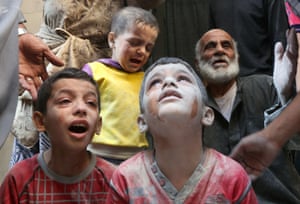
' “At the moment we have an aircraft in the sky above the hospital, so we are hoping that we won’t get hit,” said Hamza Khatib, one of the handful of medics still working in rebel-held Aleppo, who lost two patients on Tuesday morning alone.
As MPs debated the risks and benefits of a no-fly zone, he said it was the only hope for about a quarter of a million people in rebel-held Aleppo.
“The only thing that we really need is to stop the main source of the violence and killing: Russia and the regime aircraft. We don’t want medical aid, we don’t want food – that will make us last longer, but if there is still bombing, it will not save our lives.”
Monther Etaky, a journalist, stayed home with his wife and baby son during the debate. He had raced back to comfort them after the bombardment began and, with a surveillance plane circling overhead, said he was worried the jets would return. “Even the small children in Aleppo can recognise every plane by its sound now,” he said.
Like many in Aleppo, he is frustrated by the international attention focused on a proposal from the UN special envoy to Syria. Staffan de Mistura has offered to personally escort the most radical rebel faction out of Aleppo if doing so would bring a halt to the bombardment.
“I wonder if he is really interested in our situation and saving Syrian blood and life? If so, I invite him to deliver aid here personally,” Etaky said. “I invite him to escort the prisoners out of Assad’s jails, I invite him to escort out the sectarian groups fighting for Assad.”
Like many in Aleppo, he is frustrated by the international attention focused on a proposal from the UN special envoy to Syria. Staffan de Mistura has offered to personally escort the most radical rebel faction out of Aleppo if doing so would bring a halt to the bombardment.
“I wonder if he is really interested in our situation and saving Syrian blood and life? If so, I invite him to deliver aid here personally,” Etaky said. “I invite him to escort the prisoners out of Assad’s jails, I invite him to escort out the sectarian groups fighting for Assad.”
For many in Aleppo, the debate was just another day of talking that will bring no change in their suffering.
“There are debates and speeches outside Aleppo, and Assad and Russians are killing us inside,” said activist Abdulkafi Alhamdo. “We need deeds, not words.” '
“There are debates and speeches outside Aleppo, and Assad and Russians are killing us inside,” said activist Abdulkafi Alhamdo. “We need deeds, not words.” '